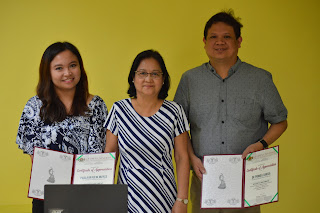by Ma. Rosette B. San Buenaventura
Research Conversations featured Institutionalizing Gender Perspective in Research: Reflexivity as an Alternative, a study by Dr. Primo Garcia, Luisa Gelisan and Paula Muyco.
The talk covered legal instruments to further strengthen gender and development (GAD) efforts such as Former President Fidel V. Ramos’ Memo Order 282 indicating that the academe must mainstream gender in its practices and/or to incorporate GAD issues in its programs and CHED’s Memo Order No. 01 stating that all private and public higher education institutions to mainstream gender in research, administration, extension, and curriculum.
Research Conversations featured Institutionalizing Gender Perspective in Research: Reflexivity as an Alternative, a study by Dr. Primo Garcia, Luisa Gelisan and Paula Muyco.
The talk covered legal instruments to further strengthen gender and development (GAD) efforts such as Former President Fidel V. Ramos’ Memo Order 282 indicating that the academe must mainstream gender in its practices and/or to incorporate GAD issues in its programs and CHED’s Memo Order No. 01 stating that all private and public higher education institutions to mainstream gender in research, administration, extension, and curriculum.
In response
to this, UPOU has institutionalized the Gender-focused Research Grants which are
given to proposed studies that have GAD components or are gender-focused after
undergoing the review and endorsement process of the research and publication
committee. The results of these studies are expected and required to be
disseminated in a forum, conference, and colloquium and/or published in a
reputable academic publication. Also, UPOU has engendered the institution’s
teaching, research, and public service activities to uphold equality in women
and men and fulfill and promote women’s human rights and development
The talk also touched on reactions to Gender
Component requirement in research – these being acquiescence and resistance. Acquiescence
was defined as taking a step towards gender mainstreaming, but not enough to
facilitate deeper understanding of gender issues and realities, while
resistance was defined as force-fitting gender perspective, action or inaction
by people, or obvious or implied
opposition. These reactions can also be used as parameters to determine the
visibility or invisibility of gender in research and the success or failure of
gender policies and institutions. To address this issue, reflexivity in
research is proposed.
Reflexivity
in research can be used (1) to look into how a research topic is anchored on
issues of dominance, gender, sexuality, class, age, and race; (2) to determine
both perspectives from marginalized sectors and researchers’ values, beliefs,
interests, ambitions, and how it shapes research; (3) as a reaction/response to
intimate questions and answers brought by doing gender-based research; (4) as
an approach to better analyze the process and results of research. In addition
to the existing GAD checklist for research, the study presented a framework
featuring reflexivity to better guide researchers in pursuing GAD research.
During the
forum, a discourse took place as a means to better understand reflexivity as an
approach in research. On one hand, there is a concern on the difficulty of
achieving reflexivity because academics have been trained and expected to be as
objective as possible, throwing away their biases and personal underpinnings
and assumptions. On the other, it is believed that academics have a
responsibility to acknowledge and practice reflexivity as an alternative
approach to gender-based research. With this, there is a call to action for
younger and starting researchers to embrace reflexivity and pursue research in
such a way that conjuncts the reflexivity in qualitative with the rigor of
quantitative research.
To close the conversation, and question-and-answer activity was facilitated where the participants were requested to reflect on the research/es that they have done and answer the following questions: (1) Was the research gender-focused?, (2) If not, what could have been a gender component in the research?
To close the conversation, and question-and-answer activity was facilitated where the participants were requested to reflect on the research/es that they have done and answer the following questions: (1) Was the research gender-focused?, (2) If not, what could have been a gender component in the research?

